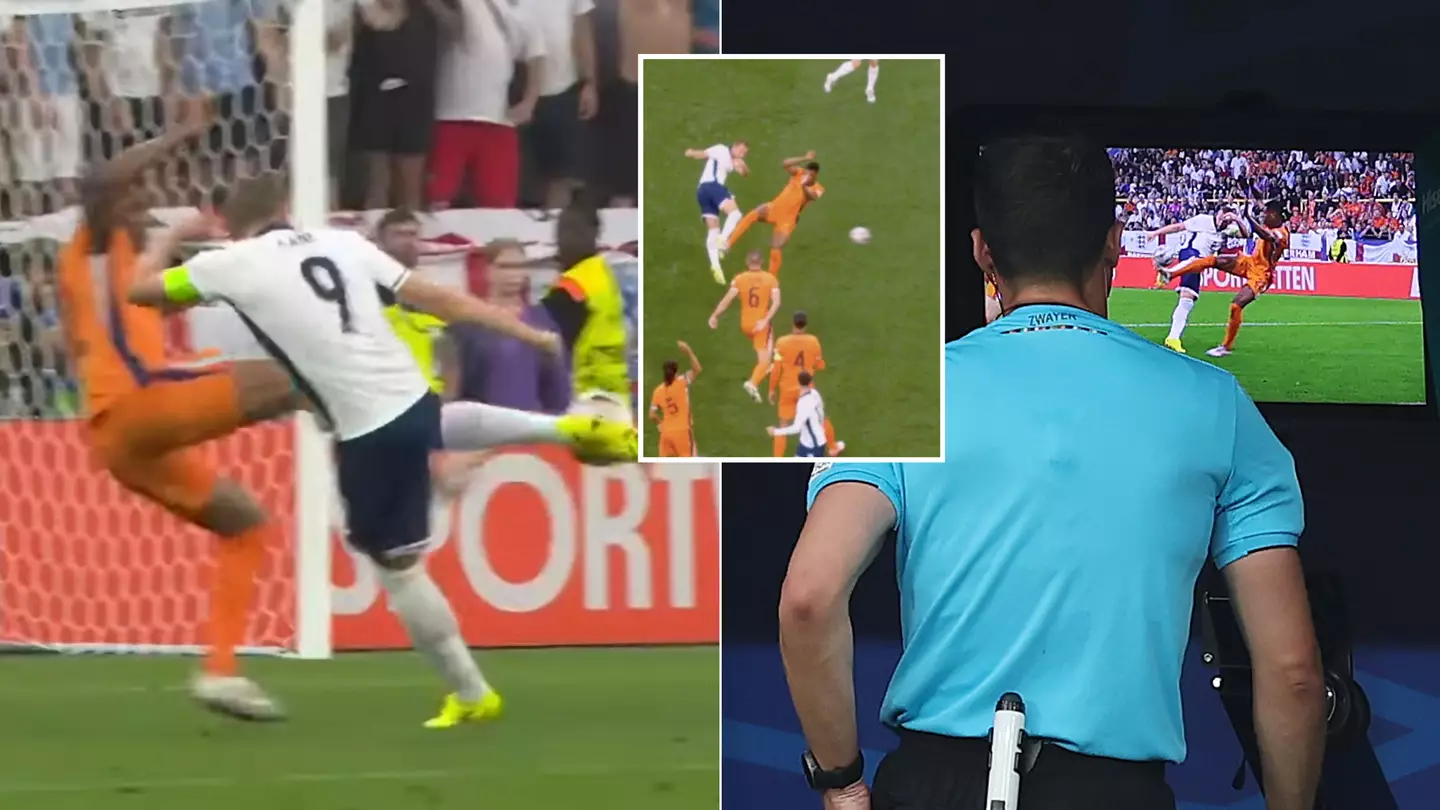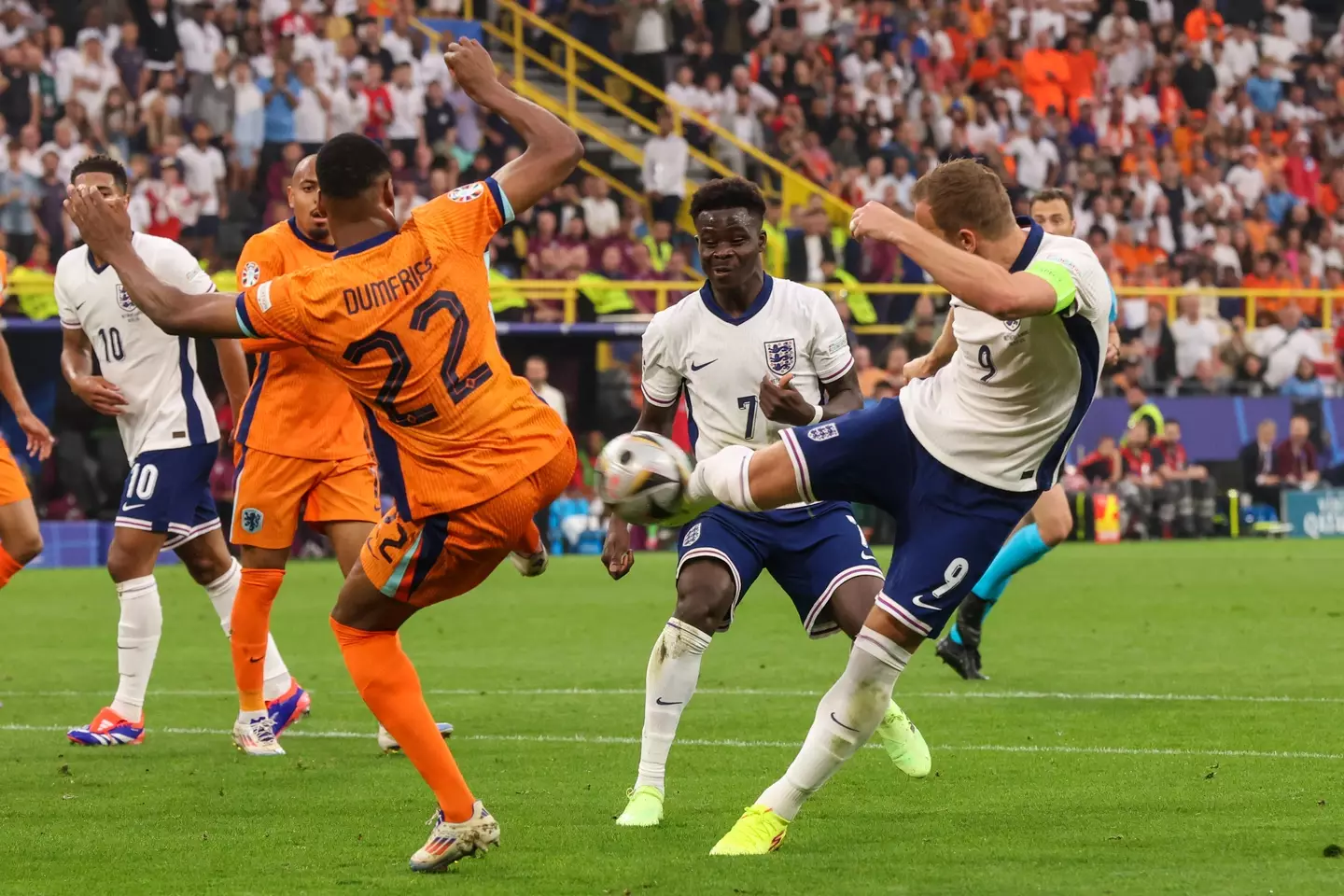
England were awarded a contentious penalty.
A former FIFA referee has given a new reason why England’s penalty against the Netherlands should not have been given.
On Wednesday England reached a second successive European Championship final with a 2-1 victory against the Netherlands.
England fell behind early in the semi-final clash thanks to a Xavi Simons strike, but Harry Kane soon equalised from the penalty spot after he was fouled by Denzel Dumfries.
The match looked destined for extra-time until substitute Ollie Watkins latched onto a Cole Palmer pass and rifled a low effort into the far bottom corner.
0 seconds of 14 secondsVolume 90%
Press shift question mark to access a list of keyboard shortcuts
Keyboard Shortcuts
Shortcuts Open/Close/ or ?
Play/PauseSPACE
Increase Volume↑
Decrease Volume↓
Seek Forward→
Seek Backward←
Captions On/Offc
Fullscreen/Exit Fullscreenf
Mute/Unmutem
Decrease Caption Size–
Increase Caption Size+ or =
Seek %0-9
England were the better side in the first half, but they struggled after half-time and were fortunate not to concede a second.
Many people – including former England defender Gary Neville – thought England were also handed a massive slice of luck when they were awarded a first-half penalty.
Kane was caught late by Dumfries after shooting over the bar, but referee Felix Zwayer didn’t award a penalty on the field.
The Video Assistant Referee (VAR) advised him to consult the pitchside monitor, after which he awarded England a spot-kick and booked Dumfries.
Whether Dumfries fouled Kane or not was a point of debate at half-time and after the match, but a former FIFA referee believes an incident before the foul should have prevented the awarding of a penalty.
Jonas Eriksson, who officiated at the 2014 World Cup, pointed out that England winger Bukayo Saka handled the ball seconds before Kane shot.

Denzel Dumfries’ challenge on Harry Kane resulted in a penalty. Image: Getty
“I am surprised that they don’t go and look and overturn the penalty,” Eriksson said, via Football365.
“According to the rulebook, it is a penalty. In reality, when you have to interpret it, I don’t think it should be a punishment.
“It is a clear hand [from Saka] and it means that no penalty should be awarded to Kane.”
Eriksson might be wrong though.
Saka’s handball was clearly accidental; the ball rebounded onto his hand, which was in a natural position given the momentum of taking a shot.
However, IFAB rules state that if a goal is scored directly from a handball, then the goal cannot stand.
But that isn’t what happened. The ball hit Saka’s hand, fell to Kane and he shot over the bar.
Kane was then fouled and a penalty awarded after a VAR review.
IFAB say that a handball should be penalised if the position of the hand makes the “body unnaturally bigger and when that position is not the result of their body moving fairly as part of play.” That is not what happened.
News
Discover the Hidden Health Benefits of Common Mallow: Nature’s Nutritional Gem (an)
Discover the Hidden Health Benefits of Common Mallow: Nature’s Nutritional Gem Common mallow, also known as Malva sylvestris, is often overlooked and dismissed as a mere weed. However,…
Boost Your Energy Like an 18-Year-Old with This Powerful Lemon and Honey Remedy (an)
Boost Your Energy Like an 18-Year-Old with This Powerful Lemon and Honey Remedy Introduction: Reclaim Your Youthful Energy Do you often find yourself wishing you could feel…
13 Health Benefits of Phyllanthus Niruri (Stonebreaker) (an)
Phyllanthus niruri, commonly known as Stonebreaker, Chanca Piedra, is a powerful medicinal herb widely used in traditional medicine. This plant is well-known for its liver-protective properties and its…
Yarrow: A Timeless Herbal Ally with Amazing Health Benefits (an)
Yarrow (Achillea millefolium), a perennial herb, has been revered for centuries as a medicinal plant with a wide array of health benefits. Its use dates back to…
Just 1 Leaf of This Plant Is Worth a Gold Mine – Euphorbia Hirta (Did You Know That?) (an)
Euphorbia hirta, commonly known as asthma weed or snake weed, may appear as an ordinary wild plant, but it is a true gold mine when it comes to its…
End of content
No more pages to load











